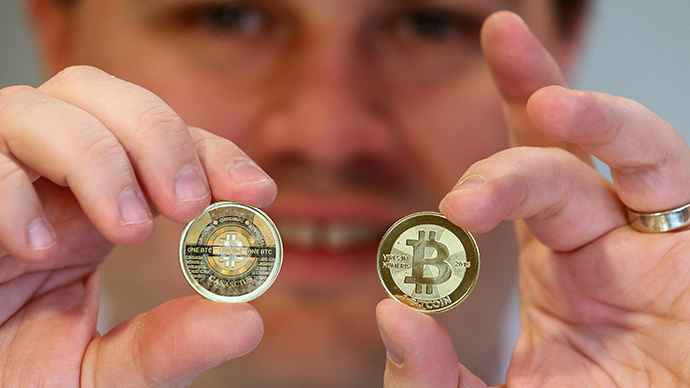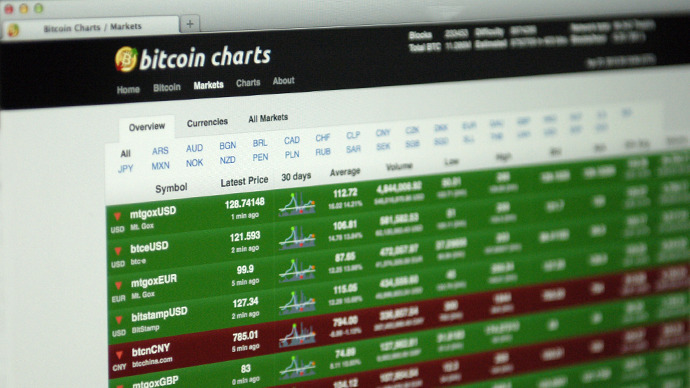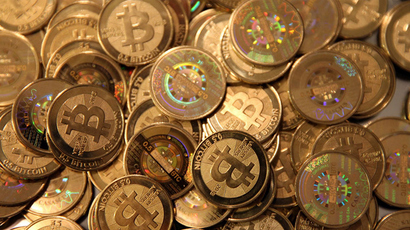SEC brings charges as first-ever Bitcoin Ponzi scheme unravels

Bitcoin, the virtual currency that has been gaining momentum in recent years, now seems to have reached the dubious milestone of its first Ponzi scheme, following charges filed by the US Securities and Exchange Commission in Texas.
On Tuesday the SEC announced it was charging Trendon Shavers of
McKinney, Texas for allegedly defrauding investors he had lured
into the Bitcoin market with promises of up to 7% interest per
week.
Shavers was able to raise over 700,000 bitcoins in the period
between September 2011 and September 2012, a sum worth some $4.6
million based on the digital currency’s value at the time.
According to the SEC complaint, Shavers was actually using funds
from new investors to pay out promised returns to those already
lured into what became a classic Ponzi scheme.
SEC spokesman Andrew Calamari said the charges mark the first
time the US agency has handled a case that involves Bitcoin.
"Fraudsters are not beyond the
reach of the SEC just because they use Bitcoin or another virtual
currency to mislead investors and violate the federal securities
laws," Calamari, director of the SEC's New York office,
said in a statement.
“Shavers preyed on investors in
an online forum by claiming his investments carried no risk and
huge profits for them while his true intentions were rooted in
nothing more than personal greed,” he added.
In addition to failing to invest funds as promised, Shavers is
also accused of retaining $147,000 worth of Bitcoin to cover his
own personal expenses, which included rent, food and gambling.
The agency said in its complaint that Shavers, using the online
name 'pirateat40,' began advertising his Bitcoin Savings and
Trust via online forums in 2011.
The biggest irony of the unprecedented case is that had investors simply bought Bitcoin directly during the same period as the Ponzi scheme they would have seen significant returns.

As CNNMoney points out, one bitcoin was valued at about $6.56 on
average between September 2011 and September 2012, and the value
has since then skyrocketed to $95.30 each as of Tuesday. Today,
the value of the 700,000 bitcoins Shavers is alleged to have
swindled exceeds $60 million, according to the SEC.
In announcing the Ponzi allegations the SEC also took the
opportunity to remind the public that all securities investments
within the US fall under its jurisdiction, regardless of whether
these are made using US dollars or virtual currency.
Along with a public announcement of the SEC’s charges against
Shavers, the agency also issued an investor alert, warning that
investors should "be wary of so-called investment
opportunities that promise high rates of return with little or no
risk, especially when dealing with unregistered, Internet-based
investments sold by unlicensed promoters.”
Bitcoin, the anonymous online currency launched by computer
programmers in 2009, owes most of its popularity to investors’
distrust of traditional or fiat money in light of high-profile
financial crises, such as the massive financial bailout of Cyprus
following its government’s raid on bank deposits in excess of
100,000 euro.
Along with alternative investment options, such as gold, Bitcoin
has emerged as another option for those distrustful of
government-issued currencies and securities.
The online currency’s anonymity has also garnered it a faithful
following from online consumers that are wary of creating
easily-traced paper trails for their currencies, giving Bitcoin
something of a reputation as the currency of choice for
underground transactions.
In June the US Drug Enforcement Administration (DEA) raided a
user of the “deep web”
Silk Road online market, which can be accessed only through the
anonymous Tor network. According to the DEA, a user named Eric
Daniels Hughes, aka Casey Jones, was charged with intent to
distribute drugs purchased from Silk Road using Bitcoin, which is
often the only currency accepted for transactions on the deep
web.
Also in June, Bitcoin’s largest currency exchange, Mt. Gox, was
forced to halt withdrawals in US dollars after federal agents
seized its account with Wells Fargo in May. The loss of relations
with payment processors meant that only wire transfers were
available to transfer US dollars into and out of the exchange,
which meant a steep increase in fees.
Since then, Mt Gox has opted to register as a money services
business with the US Treasury Department, which means that the
exchange handling over 60% of all Bitcoin trading volume
worldwide must now follow stricter accounting procedures and log
transactions in excess of $10,000.














